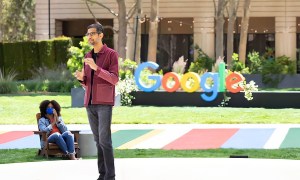
At the 2014 I/O presentation, Google premiered the Cardboard DIY virtual reality headset. This simple rig, made from materials that could easily be found in any hardware store, could turn any Android smartphone into a quick-and-dirty VR system. Since then, Google’s original design has exploded into a veritable ecosystem of headsets made from inexpensive materials like foam core and pizza boxes, so everyone can join the growing virtual reality party. Google has even teamed up with Mattel to create a VR-powered remake of the classic View-Master. Users have found all sorts of interesting ways to use the platform, such as remote campus tours, art shows, or even a wedding proposal. To date, there are now over one hundred Cardboard VR-compatible apps in the Google Play Store and over one million people using them.
So what does 2015 bring for Google’s populist virtual reality platform? Phones have been getting steadily larger in 2015 with the rise of the so-called “phablets”, so in order to accommodate that Google has released a new Cardboard design which supports screens of up to 6 inches. The magnetic selection button, which previously only functioned with some phones, has been redesigned for universal compatibility with all phones. The overall design has also been substantially simplified, requiring only three easy steps to assemble, instead of the previous twelve.
Perhaps the most exciting addition to Cardboard, however, is that the Cardboard SDK for Unity will now be compatible with iOS in addition to Android. This opens up the platform for a whole swath of new users who prefer Apple’s phones. When anyone with a smartphone can cheaply and easily turn it into a virtual reality headset, is this the tipping point for VR’s long-foretold ubiquity?
